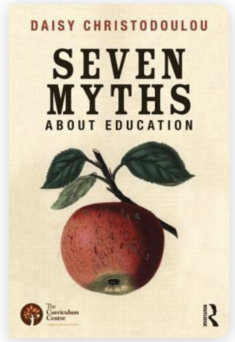💡 2-Sentence-Summary
Daisy Christodoulou, in her book “Seven Myths about Education,” challenges widely accepted beliefs in education, such as the idea that teachers should be guides rather than imparting knowledge, that group work is always beneficial, and that critical thinking is best learned through open-ended tasks. She argues that these myths are based on flawed assumptions and research and that returning to evidence-based practices, such as explicit instruction and knowledge-based curricula, can improve student outcomes.
💭 What I think about it
I worked hard when I was a teacher for 100 students in a secondary school. But I didn’t use evidence-based methods. I did what everybody else was doing, unknowingly replicating methods that don’t work. And many popular methods don’t work. There’s no evidence for the learning styles theory — the belief students learn better through their preference for auditory or visual material. Eliminating fact-based learning or direct teacher instruction is one of the worst things to do. Factual learning is a precondition for acquiring twenty-first-century skills such as problem-solving, creative and critical thinking. This book helped me understand what really works in terms of teaching and learning.
🌟 Who benefits from reading this book?
“Seven Myths about Education” by Daisy Christodoulou can benefit a wide range of readers, including educators, school administrators, policymakers, parents, and anyone interested in improving education. The book provides a critical examination of popular educational myths and presents evidence-based solutions that can improve teaching and learning. It can help educators to reflect on their own practices, challenge their assumptions, and adopt evidence-based teaching strategies that can benefit their students. Policymakers can use the book to inform their decisions about education policy, and parents can gain insights into the strengths and weaknesses of different educational approaches.
📚 How the book changed my life
This book inspired me to advocate for evidence-based education practices in their schools and communities, potentially leading to systemic changes in how education is delivered, and led, for example, to write this article.
✍️ My Favorite Quotes
- So when we want to solve a problem, we hold all the information relating to the problem in working memory. Unfortunately, working memory is highly limited. There is some debate in the literature about exactly how limited working memory is, but some of the most recent research suggests that it may be limited to as few as three or four items.28 That is, we can hold only three or four new items in working memory at any one time.
- Our long-term memory does not have the same limitations as working memory. It is capable of storing thousands of pieces of information.
- Long-term memory is capable of storing thousands of facts, and when we have memorised thousands of facts on a specific topic, these facts together form what is known as a schema. When we think about that topic, we use that schema. When we meet new facts about that topic, we assimilate them into that schema – and if we already have a lot of facts in that particular schema, it is much easier for us to learn new facts about that topic.
- The very processes that teachers care about most – critical thinking processes such as reasoning and problem solving – are intimately intertwined with factual knowledge that is stored in long-term memory (not just found in the environment).
- Direct teacher instruction was the third most powerful teacher factor. The only two more powerful teacher factors were feedback, which is not opposed to direct instruction and indeed is a part of it, and instructional quality, which again is not in opposition to direct instruction.
- Problem-solving, creative thinking, critical thinking and relating to people are all incredibly important skills. There is not one skill listed above that I would cavil at. But there is nothing uniquely twenty-first century about them. Mycenaean Greek craftsmen had to work with others, adapt and innovate.
- E.D. Hirsch has this to say: There is a consensus in cognitive psychology that it takes knowledge to gain knowledge.
- When one looks at the scientific evidence about how the brain learns and at the design of our education system, one is forced to conclude that the system actively retards education.
- They argue, correctly, that the aim of schooling should be for pupils to be able to work, learn and solve problems independently. But they then assume, incorrectly, that the best method for achieving such independence is always to learn independently. This is not the case. Teacher instruction is vitally necessary to become an independent learner.
